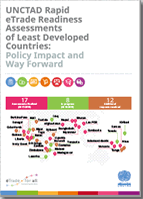
The digitalization of economic activities is a reality in today’s world economy. All countries face, though at different levels, challenges to adapt to this fast-evolving technological environment and adopt smart, forward-looking policies to fully participate in e-commerce, moving from offline to online commerce (O2O). Discussions related to e-commerce development are ongoing at the national, regional and international levels, without clear understanding of policies that should be devised to regulate its expansion and make sure that digital inequalities do not increase.
Yet, there is a growing interest from developing countries–especially from Least Developed Countries (LDCs)–to assess their readiness to engage in e-commerce. The UNCTAD Programme on Rapid eTrade Readiness Assessment (also known as eT Ready) has been designed to respond to this need and provide a thorough overview of the current e-commerce situation in the countries.
The Assessments serve as tools to identify opportunities, barriers and recommend conducive/supportive policy measures. In the past two years, 30 of 47 LDCs have expressed interest in assessing their e-commerce ecosystem. Seventeen Rapid eTrade Readiness Assessments have already been completed, with another eight underway. UNCTAD has received several requests from non-LDC countries where there is a strong interest in gauging what governments can do to support a sector of growing importance.
The 17 Assessments show that the LDCs are inadequately prepared to capture the many opportunities emerging as a result of digitalization. Given the cross-cutting nature of e-commerce, better synergies and cooperation between development partners and governments are needed to accompany the implementation of the recommendations contained in the assessments.
It is my wish that the Stock-taking Workshop on lessons learned and best practices for the conduct and implementation of the rapid eTrade Readiness Assessments, held during the UNCTAD eCommerce Week 2019, will propose concrete actions - blueprints for governments and development partners - to achieve these goals.
This note presents the results of a stock-taking survey carried out online during February-March 2019 to reflect on lessons learned and best practices in beneficiary countries. It highlights the main policy impacts of the Assessments in beneficiary countries to date and proposes avenues for the way forward.
A summary of key findings and recommendations found in the 17 Assessments carried out so far is also provided.
I would like to thank the governments of Germany, Sweden, Australia as well as the Enhanced Integrated Framework (EIF) and the Islamic Trade Finance Corporation (ITFC), which are currently promoting the digital development of developing countries, especially LDCs, by supporting UNCTAD’s eT Ready Programme.
I also wish to acknowledge eTrade for all partners who are contributing to enrich the content of the assessments. The eT Ready Programme is part of the eTrade for all initiative (etradeforall.org), which offers an online space to learn about e-commerce related capacity-building programmes offered by the 30 development partners members of the initiative. Connecting the dots is UNCTAD’ s value-added contribution to the quest for a truly global inclusive trade.
Shamika N. Sirimanne
Director, Division on Technology and Logistics


